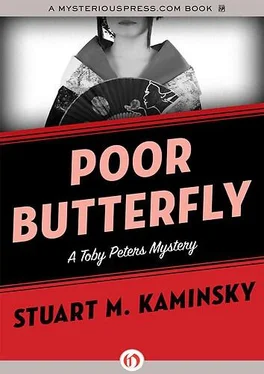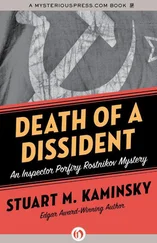Stuart Kaminsky - Poor Butterfly
Здесь есть возможность читать онлайн «Stuart Kaminsky - Poor Butterfly» весь текст электронной книги совершенно бесплатно (целиком полную версию без сокращений). В некоторых случаях можно слушать аудио, скачать через торрент в формате fb2 и присутствует краткое содержание. Жанр: Криминальный детектив, на английском языке. Описание произведения, (предисловие) а так же отзывы посетителей доступны на портале библиотеки ЛибКат.
- Название:Poor Butterfly
- Автор:
- Жанр:
- Год:неизвестен
- ISBN:нет данных
- Рейтинг книги:4 / 5. Голосов: 1
-
Избранное:Добавить в избранное
- Отзывы:
-
Ваша оценка:
- 80
- 1
- 2
- 3
- 4
- 5
Poor Butterfly: краткое содержание, описание и аннотация
Предлагаем к чтению аннотацию, описание, краткое содержание или предисловие (зависит от того, что написал сам автор книги «Poor Butterfly»). Если вы не нашли необходимую информацию о книге — напишите в комментариях, мы постараемся отыскать её.
Poor Butterfly — читать онлайн бесплатно полную книгу (весь текст) целиком
Ниже представлен текст книги, разбитый по страницам. Система сохранения места последней прочитанной страницы, позволяет с удобством читать онлайн бесплатно книгу «Poor Butterfly», без необходимости каждый раз заново искать на чём Вы остановились. Поставьте закладку, и сможете в любой момент перейти на страницу, на которой закончили чтение.
Интервал:
Закладка:
“You could,” Stokowski said, “but I wouldn’t advise it.”
“See,” said Shelly. “Even Toscanini says I couldn’t help it.”
The place went dead. Eyes turned to the Maestro. He shook his head, turned his back, and moved back toward the stage.
“Five minutes, ladies and gentlemen,” he said softly.
“What did I say?” whined Shelly, sensing blunder, a sensation familiar to him. “I said something?”
“Jeremy will explain,” I said. “I’m going to find Raymond.”
“Raymond?” asked Shelly. “Who the hell is Raymond?”
“The man who knows where everything is around here,” I said, moving toward the exit. “Might know something about projectors.”
8
Finding Raymond left me tired, dirty, and a little confused. I got lost in dusty corridors and dead ends. Then I borrowed a flashlight from a reluctant painter. Raymond had said something about living in the tower. There were five towers in the Opera. All of them were up wooden stairways.
The first stairway I tried was at the end of a narrow corridor. The walls were decorated with blue and white plaster drapes that wouldn’t have fooled Shelly with his glasses off, even if there weren’t chunks gouged out of the plaster. Between the plaster drapes were paintings of overstuffed horses and guys dressed in red uniforms, little hats, and boots. Shelly would have liked the horses. They all had big teeth and looked as if they were familiar with bad breath. The corridor looked like the lobby of the Chinese Theater in L.A. in the middle of a renovation.
The stairway was rotten, but I made it to the top and found a padlocked room. The lock was rusty. I pulled at it and it came off. It took two kicks to get the door open wide enough for me to get in.
Enough light got through the dirty windows to show me that someone back in the bad old days had used the place to entertain himself and whatever ladies he could lure to his red velvet lair. There were mirrors as high as a basketball net at angles surrounding a big square bed. The mirrors were smoked and dirty but showed the image of the bed behind their cloud cover. There were indentations in the ancient mattress, the memory of bodies, proving that sex wasn’t invented in the Roaring Twenties. The couch and two chairs were covered in red velvet, and on the wall hung the portrait of a man with his hands on his hips, his long hair combed back, his head cocked to one side. He was a little on the heavy side, but he made up for it in confidence. His smile was all teeth and phony.
The second tower had fewer ghosts and no portraits. It took me a while to get there, but I finally found a hallway with statues of old men draped in stone robes. I half-expected to run into Billy Batson. The steps to this tower were in no better shape than the first one I’d tried, but the room at the top wasn’t locked. It was filled with magazines-piles of magazines, magazines toppled over, magazines scattered. All covered with a layer of gray dust.
I picked up a Popular Mechanics from 1913 and discovered that submarines would be the most important weapon of the twentieth century and that someone was planning a cruise ship with more space inside it than Yankee Stadium. A 1905 Police Gazette with the cover missing had a story about how much it would cost to keep the Chinese out of the U.S.A., and suggested that it would be worth every penny. I tried one more magazine. It was Casket and Sunnyside , the undertakers’ journal. I threw it in a corner, hoping the tower I was looking for wouldn’t be the fifth one.
It wasn’t.
The third tower was Raymond’s. I could tell because the stairs were not as covered with dust, and the door at the top was locked.
Music was coming from behind the door, a violin. I knocked and the music stopped. I knocked again. No answer.
“Raymond,” I called. “I know you’re in there.”
“No you don’t,” he said.
“I heard you playing,” I said. “And besides, you just answered me.”
“You’re smart. I’ll give you that,” he said.
“I appreciate your praise,” I said. “Let me in. Someone tried to kill Lorna Bartholomew again.”
I heard his steps move toward the door, and a bolt pulled.
“Why do you keep the door bolted if you’ve been the only one in the building for years?” I asked, stepping into the room and looking around.
“Lived a lot of years being cautious,” he replied.
“Can’t argue with that,” I said, looking around.
The room was lighted with three fancy, turn-of-the century lamps. Two plush couches faced each other in the center of the room. Behind them was a massive four-poster bed. The walls were draped with tapestries-one a scene of men in feathered hats about to shoot a deer, another a scene of two men with feathered hats whispering while two young women stood giggling at a fountain. A violin lay on one of the couches. A phonograph, an old wind-up thing with a megaphone speaker, sat on an ornate table. The chest of drawers in the corner looked as if it had been designed for a giant with a taste for fancy wedding cakes.
“Props,” he said. “Pulled ’em up here years ago. Gonna turn me in?”
“No,” I said. “You play the violin.”
“Play every damned instrument man invented,” he said proudly. “Even the lyre. Nothing else to do. One instrument a year, night after night. Plenty of music. Plenty of instruments. And I can repair them all. Can play any tune. You name it. Name the instrument and I’ll play the song on it. Even do ragtime on a French horn.”
“‘Sheik of Araby’ on a tuba,” I said.
“Hell, I can do that,” he said. “Do it sitting on a toilet.”
“Projectors,” I said as he looked around the room for either a toilet or a tuba or both. He stopped looking.
“Projectors,” he repeated, turning to me.
“Movie projectors,” I said. “One of them almost killed Miss Bartholomew.”
“Couple of old Edison projectors in the balcony,” he said, picking up his violin. “Can play this thing like a guitar. Listen.”
He started to plunk, and I put my hand out to stop him.
“Where were you fifteen minutes ago?” I asked.
“Where? Here practicing.”
“No one can be as eccentric as you pretend to be.” I looked him directly in the eye.
“Son,” he said, “it is not easy. I’m the harmless old coot. The character every good theater needs. If I didn’t exist, they’d have to go out and cast me.”
“I thought so,” I said.
“Thought so, hell,” Raymond said. “I’m the genuine article. Been playing this role so long I am it. Don’t know where my act begins and ends. Danger of playing any role too long. You want my secret? I was an actor. When this place was a theater, I was an actor in the last show. Quake came and went and I stayed. Didn’t have much money. Didn’t plan to stay. Went out for some roles. Didn’t get them. It just happened.”
“Someone who knows this place has killed a man, tried to kill me and Miss Bartholomew,” I said. “You’re the only one who knows this place that well.”
“Miss Bartholomew,” he said. “Tell my old Granny. I was with the fat guy when she came screaming. Ask him.”
He was right. He had come down the hall with Lundeen seconds after Lorna had come up the stairs after the Phantom … or someone … had tried to strangle her.
“Coming to you, son?” he asked.
“Yeah, but I don’t give up easy.”
“No man worth a brass turd would,” he said.
“Cut it out, Raymond,” I said.
“Told you, I can’t. Lots of people have been nosing around this place since they decided to open it up again,” Raymond said. “That fat guy.”
Читать дальшеИнтервал:
Закладка:
Похожие книги на «Poor Butterfly»
Представляем Вашему вниманию похожие книги на «Poor Butterfly» списком для выбора. Мы отобрали схожую по названию и смыслу литературу в надежде предоставить читателям больше вариантов отыскать новые, интересные, ещё непрочитанные произведения.
Обсуждение, отзывы о книге «Poor Butterfly» и просто собственные мнения читателей. Оставьте ваши комментарии, напишите, что Вы думаете о произведении, его смысле или главных героях. Укажите что конкретно понравилось, а что нет, и почему Вы так считаете.












